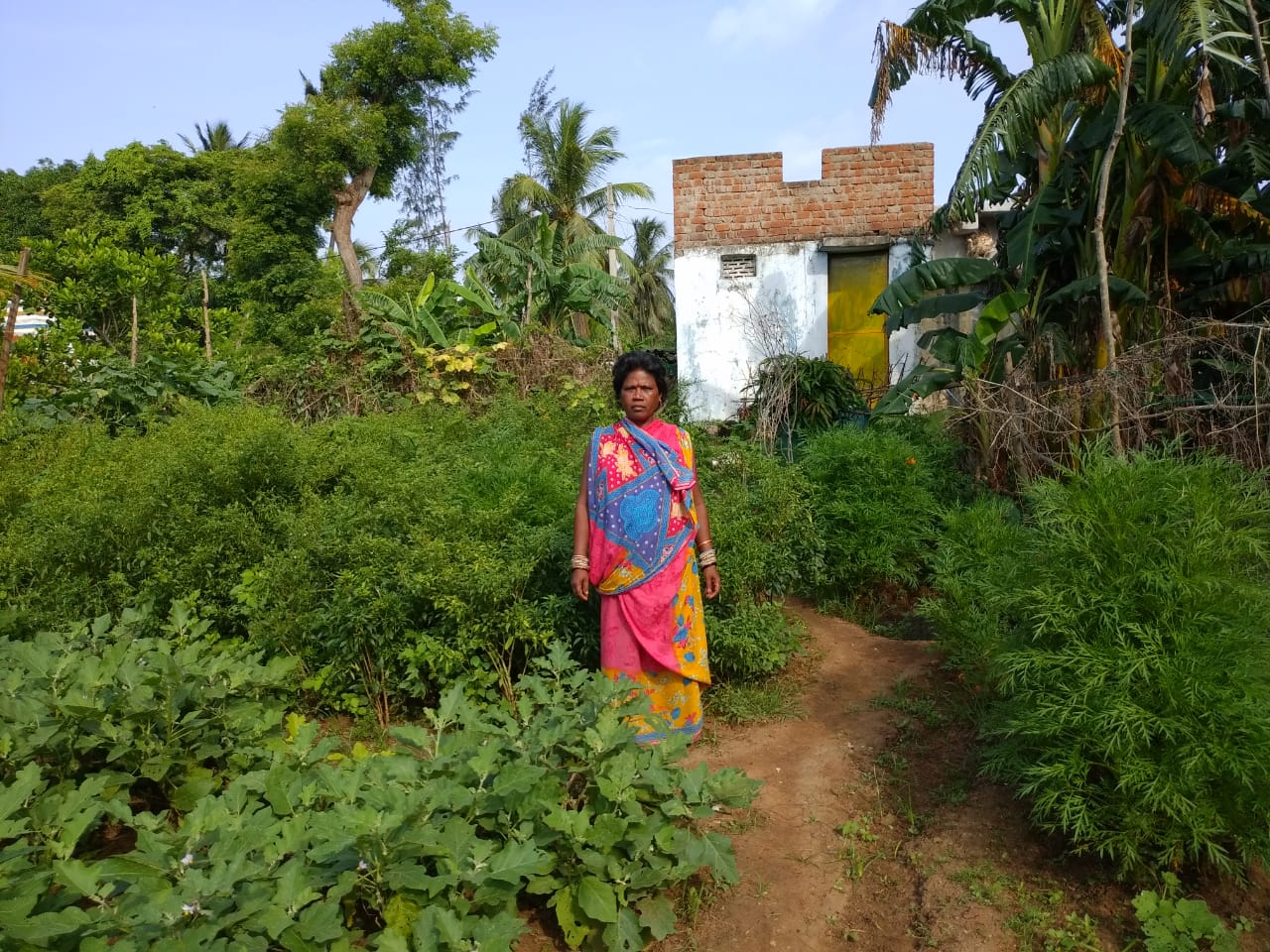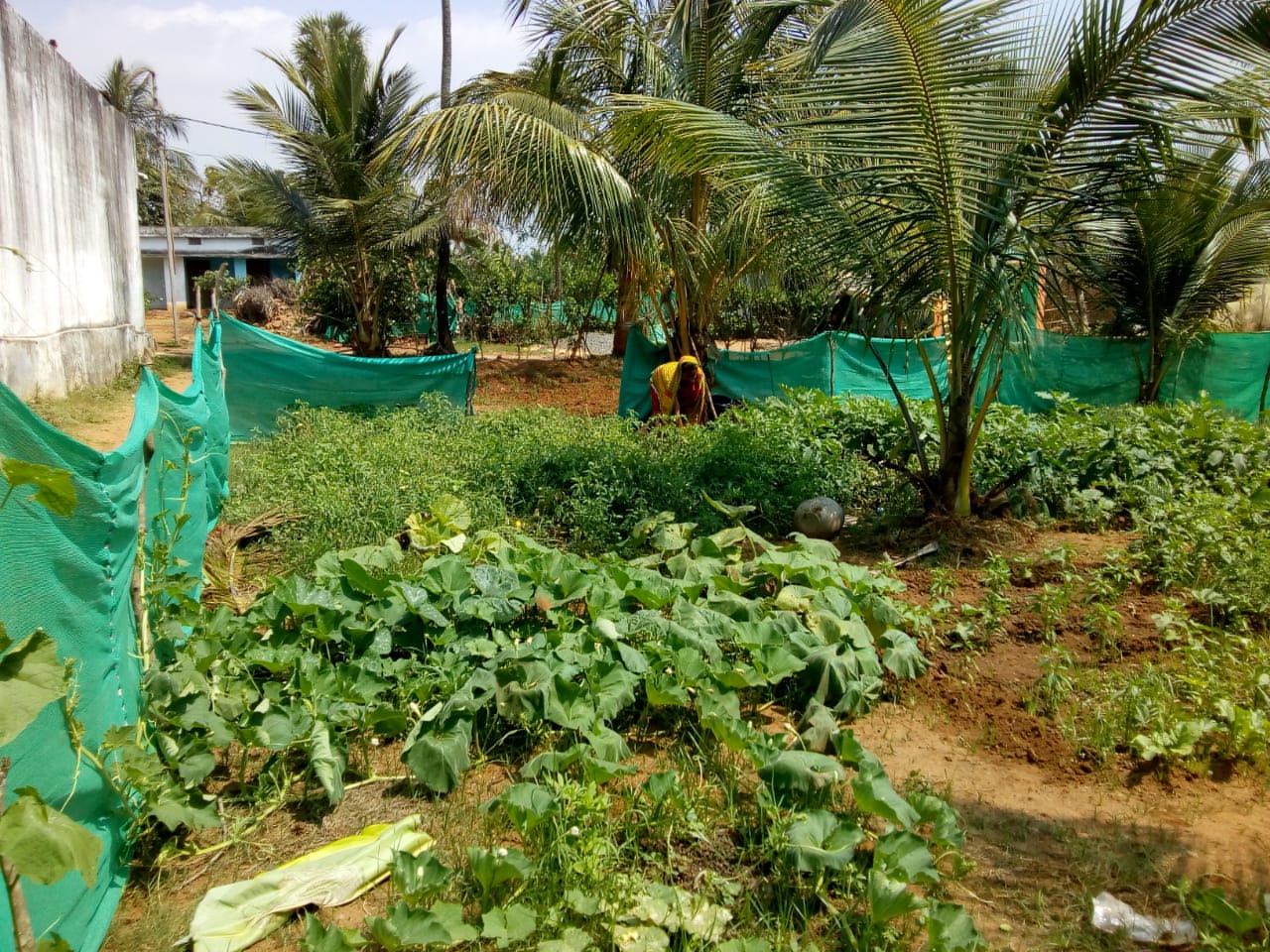Nutrition gardens enable dietary diversity while conserving water
StoryBy Rahul Thekdi, Chandrika Pattnaik
14 July 2020
A modest beginning with an initial success at kitchen farming turned Saraswati into a full time vegetable farmer. In 2018, she started the kitchen garden to reduce expenditure on food but today it has become an important source of income for her family.

Kitchen farming turned Saraswati into a full time vegetable farmer.
Photograph by Jashoda Devi
When Saraswati Pradhan from Chasa Kanamana village in the Ganjam district of Odisha began to grow the nutrition garden, she had no inkling that her entire household would reap its benefits. Over time, the garden not only gave regular produce for household consumption but also reduced the monthly household expenses. With a regular supply of fresh and nutritious vegetables, the garden also became a health safety-net for the family.
Saraswati stays with her husband and son. She also raised her sister’s two sons, after the sister passed away in 2016. Her husband became ill and Saraswati’s sole income from the labour work on construction sites was inadequate to support the extended family. Hence, as a supportive measure, Saraswati took a small orchard on lease, where she grew Kewda (a flower plant used in cooking), mango and cashew. The earnings were a meagre yearly sum of around ₹10,000, from which she paid ₹3,000 to the lessor of the orchard.
In 2018, her brother living in the neighbouring village bought land behind her house but left it untilled. Jashoda Devi from Gram Vikas continuously encouraged Saraswati to grow vegetables on her brother’s land. Motivated by Jashoda’s encouragement, Saraswati decided to work on the nutrition garden to cut down on the household budget and get nutritious and fresh vegetables.
Saraswati started growing a few leafy vegetables in November 2018. In three weeks, she harvested surplus vegetables. She not only sold some part of it in the local market for ₹1,800, but also distributed a portion to her neighbours. Encouraged and optimistic, Saraswati bought new seeds with her modest savings in January 2019. Soon, her nutrition garden had a variety of vegetables like potatoes, brinjal, bottle gourd, lady’s finger, tomatoes, beans, radish, cauliflower, green chillies, coriander leaves, and papaya.

Saraswati Pradhan has grown a variety of vegetables in her small piece of land. Photograph by Jashoda Devi
Her arduous efforts motivated the family to join her in tending to the garden. A noteworthy feature of Saraswati’s garden is the use of waste water from the bathroom and kitchen. The grey water is collected in a pit and channeled to the plant beds. This method reduces reliance on external sources of water and even saves efforts in watering the garden. The grey water is collected in a pit, filtered by the soil and the plants are grown with soil moisture.
Thanks to the nutrition garden, Saraswati need not rely on the market for household consumption of vegetables. She has also developed enough insights on the seasonality of crops, crop-cycle and weather parameters to effectively plan the production cycle of the garden. Saraswati ploughs the soil, prepares the small beds for new saplings and looks after the plants. She spends two hours daily in the morning and evening in her garden for weeding and covering young plants with nets.
Saraswati’s neighbours have realised that vegetables from her garden carry variety and freshness, often missing from the local market. Her eyes glint while recalling how she once used to share vegetables with neighbours. Now, the same neighbours are her loyal customers as they visit her to buy vegetables.
Saraswati is also a treasurer of the Village Water and Sanitation Committee (VWSC) and an active Self-help group (SHG) member. She used her participation in the VWSC and SHG meetings to drive home the wondrous benefits of vegetable garden. Her narratives have inspired many in her village. The villagers also had a testimony in the form of her flourishing garden. Today, almost half the village households have been nurturing vegetable gardens in their backyard.
Saraswati watering the plants.
Photograph by Jashoda Devi
ACKNOWLEDGEMENT
Jashoda Devi, field expert on WashPlus with Gram Vikas, helped in data collection for the story. Priya Pillai edited the story.
ABOUT THE AUTHOR
Rahul Thekdi is a communication intern and Chandrika Pattnaik is a Junior Manager at Gram Vikas.
RELATED BLOGPOSTS
Turning losses into gains: How Mallipanka farmers find success in new crops
Reviving agriculture: Mallipanka’s first strawberry farm story.
Ensuring dignity beyond life: supporting migrant families in their darkest hours
Gram Vikas ensures safe migration and dignified repatriation for deceased migrant workers, supporting bereaved families.
Collective leadership transforms ageing overhead water tank to secure household water supply for all
Kalakhadi’s aging overhead tank revived through collective leadership, ensuring sustainable water supply for the community.